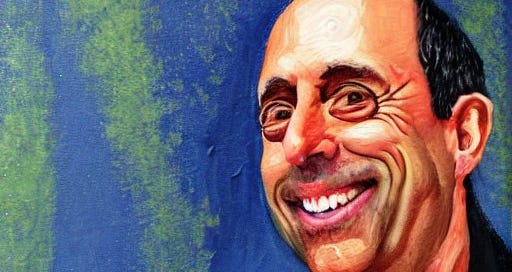'Goldman Gary' Must Go
Gary Gensler is a problem. He's on a selfish crusade for political points that will end with the United States losing economic relevance if Congress doesn't rein him in.
Gary Gensler is 65 years old. Like him, I plan on being active at 65. Unlike him, at 65 I highly doubt I’ll still be trying to climb the ladder of some sort of hierarchy. After a long career in both the public and private sector, one has to wonder why he isn’t enjoying the fruits of all his labor. Why is he not living his life and exploring the freedom that likely goes with a 9 figure net worth?
Instead, Gensler is full of ambition. And why shouldn’t he be? Afterall, everyone is simply going to live forever, right? Zee ruler uf zee WEF is 84 and has no succession plan. The President of the United States is 80. The Treasury Secretary is 76. The Chairman of the Federal Reserve is 70. 65 is the new 55. And Gensler doesn’t just have tread left on the tires, he has goals to keep his star rising.
As such, Gensler seems committed to killing and dragging home as many crypto carcasses as he possibly can in hopes that it will earn him a promotion should democrats retain control of the executive branch in 2024. Judging by the red ripple from 2022 mid-terms, he probably has a shot. Unless, of course, he doesn’t make it that far.
Political Liability?
Gary Gensler could be quickly turning into a political liability for democrats in 2024. Despite our many faults, the cool thing about crypto advocates is we are part of a community that pulls from all areas of the political spectrum. There’s a clear overlay with hardcore Bitcoiners and libertarianism that I can certainly empathize with very much. Congressional “personalities” on the right understand the pro-business innovations that distributed ledger technology can enable. And the social equality seekers on the left seem to grasp the value of NFTs to the independent artist or creator.
It’s rare to find something where seemingly the entire political spectrum of those within a community appear to be in agreement on the inadequacy of a self-anointed King; but Gensler has pulled it off. Crypto regulation is quickly becoming the focal point of single-issue voters who have a lot of skin in this game. And for full disclosure, you can probably put me in that camp at this point.
But make no mistake about it, I take the view that a pro-innovation stance here is the correct one for the USA’s continued relevance in global finance. How the ballot voting turns out in 2024 is somewhat irrelevant to the end user because we’re not asking for permission and many of us never will. This is already decided and I’ve shown examples in previous pieces. Similar to how the son or daughter inevitably takes the keys away from mom and dad so they don’t harm themselves or their neighbors; the octogenarians, Mungers of the world, and wannabe Treasury Kings need to be saved from themselves so they don’t do permanent damage to those around them.
If the US establishment blows this, the way the story ends isn’t a hard one to handicap. Users in the United States will continue engaging with cryptographically secured assets regardless of what the state says. But it’s the domestic businesses that actually want to be compliant with sensible rules that will miss out. And that will be a real shame.
Brazen Nonsense
What is a security? It turns out it’s whatever Gary Gensler’s SEC says it is. The long held view that the Howey Test is the proper framework for discerning what is or isn’t a security is about to be shattered if the SEC follows through with any post-Wells Notice action regarding Binance USD (BUSD-USD). I take this view because there can be no reasonable expectation of profit from a USD pegged stablecoin. The entire point of holding stables is that there is no price fluctuation. Thus, BUSD can’t be a security using the Howey Test. However, the financial rules of the old guard give certain discretionary liberties to the SEC so the personal views of the unelected SEC chairman do unfortunately become important.
Regardless, to assume that BUSD is a security simply because it has a central-issuer and serves as a dollar derivative is a dangerous path to go down and it opens up an enormous rabbit hole. Are Amazon AMZN 0.00%↑ gift cards also securities then? They are dollar derivatives and can trade at a discount or premium to the underlying value in an open market...
Of course, the idea that Amazon gift cards might be securities makes about as much sense as the argument that registering with the SEC protected BlockFi depositors and investors - BlockFi went bankrupt shortly after being forced into ‘going legit.’
And that gets us to the real purpose of all of this. The actions of the SEC have absolutely nothing to do with protecting investors and everything to do with protecting an incumbent system. ‘Goldman Gary’ made that clear when he told New York Magazine he doesn’t think it’s necessary for the financial system to make its way to public distributed ledgers.
“I personally think it’s very rare that you need that, but it’s possible”
Stunning. Gensler doesn’t think transparent ledgers are all that necessary in most cases? Hmm. I wonder why? More transparency would have likely been helpful in preventing FTX. It would have likely been helpful in preventing Celsius. And it would have likely been helpful in preventing MF Global, Lehman, Bear, or any number of other TradFi blowups that have harmed US residents.
The indifference to innovation isn’t surprising because power hungry psychopaths regulators in the US federal government like the monopoly on currency and violence. Another interesting comment from that piece is the argument that Bitcoin and only Bitcoin is the one crypto asset that isn’t an unregistered security. Reason? Because there isn’t a website with a physical address, a doxed creator, or a centralized team developing it.
Ok.
Let’s indulge Gary’s imagination and assume those are indeed the correct goalposts for determining what is or isn’t a security in the crypto market. That also means Monero isn’t a security. It means at least a half dozen other privacy coins would also not be considered securities under those guidelines. And it also means some of the shittiest of the shitcoin pump and dumps in the crypto market would also not be securities. How could that square with investor protection? It doesn’t.
But what Gary just described can’t possibly be the correct way to view cryptocurrencies because what it implies is that the SEC believes Bitcoin is not a security simply because the agency doesn’t know how to sue anyone over it. He just can’t come right out and say it like that.
Furthermore, a word that was clearly missing from Gary’s explanation was “decentralized.” Bitcoin is, by just about any measure, the most decentralized coin in crypto. So why wasn’t that word mentioned as justification for BTC not being a security? Likely because decentralization is somewhat ambiguous and assigning that word as a means of determining what is or isn’t a security would also require a hard decision on which metrics and what thresholds to those metrics constitute a true level of decentralization enough to satisfy the SEC - and Gensler simply doesn’t want to have to do that because it would limit his ability to regulate by enforcement.
Is it starting to make more sense why crypto advocates claim the rules aren’t clear? It’s because no matter how many times Gensler tells a journalist the opposite without a challenge, the rules aren’t actually clear. If they were clear and uniformly applied, every major retailer in the country could be charged with selling unregistered securities simply by running a gift card program or a rewards program.
In The End
Capital flows where it wants to. The expectation that assets which exist for the purpose of disrupting the incumbent system should be handcuffed by arbitrary rules of the incumbent system is silly. Demanding that ETH, LTC, ATOM or countless other digital assets should be registered as securities simply because the person tasked with overseeing securities wants them to be isn’t too much different from expecting the US Postal Service to oversee the delivery of all of the world’s emails. It would be like the FCC chairman expecting Spotify SPOT 0.00%↑ to apply for call letters and a broadcast license as if it were a terrestrial radio station.
Streaming media is a completely different technology than traditional broadcast signals that carry different rules and regulations for compliance; but it all looks and sounds the same to an 8 year old. Spotify is not a radio station and Ethereum is not a security no matter how badly Gary Gensler wants you to think it is. If something walks like a duck, looks like a duck, and quacks like a duck, it might be a duck. But the way I see it, what the SEC is doing right now is more akin to decreeing that all birds are ducks.
It’s ducking stupid and we shouldn’t put up with it anymore.
Disclaimer: I am not an investment advisor. I’m not a securities law expert. I’m not an expert in anything.






Thanks... good article. It's all about making the definition what "they" want them to be and then of course changing them to fit better if they see fit! Crazy is as crazy does!!
Crypton https://u.is/ is highly accessible and user-friendly, which means that even those who are new to cryptocurrency can use it with ease. This makes it a practical choice for anyone who wants to transact securely and efficiently.